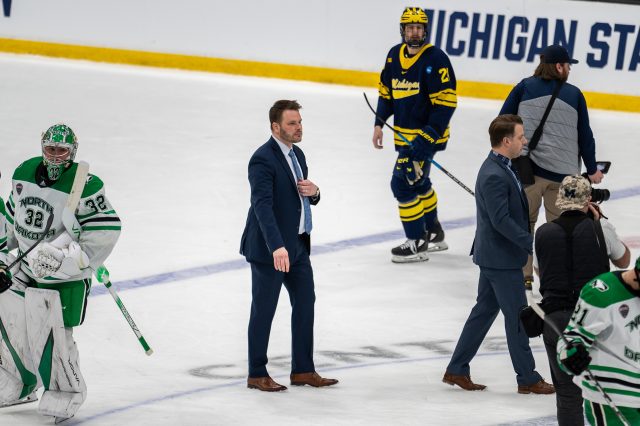[ad_1]
In his first two years at the helm, Michigan coach Brandon Naurato wasn’t in control of the Wolverines’ schedule. Therefore, Michigan played some lighter nonconference matchups that padded its overall record. However, if Naurato had his way, that wouldn’t have been the case.
While these matchups may provide a confidence boost for the Wolverines, they don’t do much in building Michigan’s status as a hockey powerhouse. Dominating an unranked team isn’t a strong argument for the Wolverines to rise in the ranks.
But now that Naurato is in full control, the nonconference matchups will be no cakewalk, as he has strategically put no given wins in this season’s schedule. Because in order to be a strong tournament team with a winning record, the No. 7 Michigan hockey team has to play — and win — against other tournament-worthy teams.
And that difficult schedule starts right away.
“If you want to be the best team in the country you have to play the best,” Naurato said Tuesday. “You have to learn and grow through some failure and learn and grow through some success. So we want to play the best competition we can all the time.”
The Wolverines open their season at home against Minnesota State. While the USCHO preseason rankings have the Mavericks just out of the top 20, they cannot be counted out as an easy opponent. They finished at 18-15-4 last season, ultimately losing to Michigan Tech in the CCHA semifinals. Additionally, Minnesota State picked up Minnesota transfer Rhett Pitlick in the offseason, who tallied 79 points in his three years with the Golden Gophers.
The Mavericks are Michigan’s only unranked non-conference opponent in the preseason polls. While the rankings are destined to change as the season progresses, the sentiment remains — Naurato built a challenging schedule for the Wolverines.
Arizona State, St. Cloud State, Boston University and Western Michigan round out Michigan’s nonconference opponents. The Wolverines didn’t play the Sun Devils last season, but they split a series with the Huskies, the Terriers made the Frozen Four and the fourth-seeded Broncos made it to the same NCAA Regional as Michigan. All of their records speak for themselves.
“We want to play the best, we want to play teams that are going to be in the tournament,” Naurato said. “That’s what helps you navigate who you are and where you are in the pecking order. When you win those tough games, it means something, and you find out something about yourself. And when you come up short, it means something and you find out something about yourself.”
With five of the seven Big Ten teams ranked within the top 20, the Wolverines’ schedule doesn’t get easier once nonconference competition wraps up. And based on the Michigan’s difficulty sweeping series last season, it will likely be even harder this year. Last year, the Wolverines had series like Lindenwood and Stonehill, in which they could regroup before tighter competition. But this year, Michigan likely won’t skate away with easy wins. It will have to fight for each one.
The players are choosing to embrace the difficult schedule instead of backing down. When asked about the intense matchups ahead, graduate defenseman Jacob Truscott put it simply:
“That’s why you come to Michigan.”
The Wolverines have shown they can claw their way to victory in big games, such as the NCAA Regional Semifinal against North Dakota and the NCAA Regional Final against Michigan State. However, Michigan has also fallen short in the past three seasons in the Frozen Four, the biggest game of each season.
With Naurato in command of the schedule for the first time in his tenure, each weekend will be a battle for Michigan. The Wolverines won’t have the opportunity to take their foot off the gas and coast against a weaker opponent.
But as Truscott said, players come to Michigan to play in these high-stakes games. So the Wolverines have to be ready for any opponent that comes their way — no matter the difficulty.
Related articles
[ad_2]
Source link











